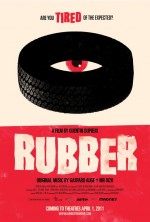Rubber

The main plot of Rubber follows an old, used truck tire rolling down Route 66 encountering typical road-movie types: motel workers, a bored local kid, a local sheriff, and a sultry female in a vintage convertible. Robert the rubber tire begins telepathically killing people one at a time, without provocation or explanation.
Robert the rubber tire is not a cop with a looming retirement or a daughter he has to put through college. He’s a rubber truck tire without a love interest or a backstory or a motivation of any sort. So, in absence of plot, we are forced to consider the meaning of the murders on the screen. Whatever budget was put in to this production was clearly spent on blood and guts. As the tire quivers in front of a person they suddenly explode into bits of bone, blood, and tissue. The crowd laughed at the screening I attended, clearly out of nervous confusion, not knowing what to make of a movie about a psychopathic truck tire on a mass murder spree.
Wings Hauser began the screening by telling us about a conversation he’d had with Rubber’s director, Quentin Dupieux, where the actor asked, “What does any of this mean?,” and he insisted that the director said it meant nothing. Hauser seemed indifferent, if not downright negative, about his new movie, even though he has the largest speaking role and is really quite good in it. He spoke cynically about the film and the director, instead preferring to talk about a new partnership he has to produce and star in new movies.
After his barely coherent speech, I expected Rubber to be awful, but it wasn’t. It is a highly conceptual, experimental feature with beautiful cinematography, great acting (especially by Hauser), and a truly unique approach to storytelling that’s long on message and short on plot.
The subplot is an audience, gathered in the desert a few miles from the unfolding action. For some reason, they are able to see everything the tire does, and they act like it’s a TV show. Their behavior is as bizarre and inexplicable as any of the other elements of this film, but it is still important to the message, because their host in the desert is a go-between, middleman character who establishes that the actions we see on the screen are, he believes, “fake.” Like a movie or a TV show. Slowly, we learn that he’s wrong. The deaths are real. In fact, only Hauser’s skeptical loner survives for the finale. The movie does not have a traditional beginning, middle, and end.
Some people laughed all the way through it.
Some people walked out because, like Wings Hauser, they thought it didn’t make any sense at all.
And to some people, this was the most serious piece of art they’d ever experienced.
Rubber changed my opinion on violence in movies, television, and video games. Or, at least, it prompted me to take a position for the first time. Just as the mediator in the film assures the audience that it is only “fake” violence committed by the tire (perhaps representing America’s transient car culture), he is then killed by it. And so is the audience.
The man thought he was above it because a bourgeois person believes he is protected by his position in The Establishment. And the audience who thinks they are only passive participants are all killed by their entertainment. In America, where we make sacred proclamations on bumper stickers which read “guns don’t kill people, people kill people,” “guns don’t kill people, I kill people,” or worse, we all believe that we are passive participants in our violent culture, even though we experience violence through entertainment routinely even in our own homes, even with our children present. We desensitize ourselves to violence as a matter of principle. We’d rather sacrifice tens of thousands of innocent lives to gun violence every year rather than risk a future where our desire for “gun rights” is in jeopardy.



Leave a Reply